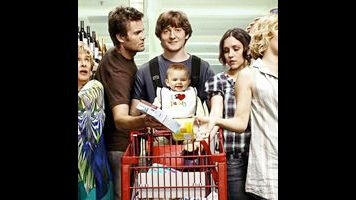Tonight's episode didn't explode, but it did keep popping little surprises. In addition to being goofy and silly, it was self-referential about its own genre, to the point that, at times, you almost could have been watching The Simpsons. The plot involved Jimmy's discovery that, at 13, he had been a musical prodigy, capable of making all the girls swoon with his soulful singing and grooving at the piano. The family did their best to cultivate his talent, which they recognized as "his only ticket to get us out of this hellhole." That all came to an end after he received a blow to the head with a thrown golf club, which wiped out his memory of the eight most glorious months of his young life. This was clearly a sitcom plot, so it made sense for Burt to refer back to old Gilligan's Island storylines when he conferred with the doctor about Jimmy's condition. It was a little late to be seeing a doctor about what had happened to Jimmy when he was 13, but as Virginia explained, "We didn't have health insurance. But we got you bed rest. And we prayed. And then we gave you every single thing in the medicine chest."
The doctor downplayed the usefulness of Bob Denver's oeuvre with regard to finding a treatment for Jimmy, on the grounds that "It's just dangerous to get medical advice from a TV comedy." But the show seemed to regard his attitude as misguided at worst and, at best, the attitude of a spoilsport. In fact, the episode began with Kate Micucci, as Shelly the singing babysitter, performing an our-story-so-far theme number after noting that we'd recently lost "one of our favorite seniors, Sherwood," who "used to start each day with a song that perfectly recapped what was going on." It may not be a coincidence that the last time I saw a sitcom pay extensive tribute to Sherwood Schwartz (who died this past July, at whatever age Methuselah was when he started thinking about retiring), it was Roseanne, another smart show that confused some people with its ability to forge a direct connection to the regular-folks, working class viewership that kept Gilligan in reruns for perpetuity. (The episode also managed to work in references to Family Guy and Happy Endings, though it didn't refer to Happy Endings by name; Virginia just mentioned "a sitcom on ABC where a lady could only speak Italian when she was drunk." Probably this was due to some rule that Rupert Murdoch has against plugging the competition on rival networks, but I'd love to think that it's a sign that someone at Raising Hope regards Happy Endings as too relatively highfalutin' to have its name spoken in Greg Garcia's universe.)
All this was very clever, but it was seeing what the cast did with it that renewed one's faith in this show. Especially when Martha Plimpton was close to center stage and looking fit to bust with motherly pride over her Jimmy's Liberace-like gifts. Plimpton has developed into a world-class mugger and puller of faces, and giving her an excuse to be proud of her son for a change and have something to lord over all the other mothers meant giving her a whole new set of emotions to joyously overplay. Garret Dillahunt was less of a one-person three-ring circus, but he did get to drunkenly boast of his ability "to roll a frisbee on its side very far," which, on reflection, didn't even seem to be code for anything. There was even a suggestion at the end that, thanks to his 13-year-old self, Jimmy might be making headway in his pursuit of Sabrina. I don't know how long the producers feel they're obligated to string this thing out, but I'm ready to see some ice get smashed. Sexual tension is only better than the thing itself when it's between characters you don't really want to see doing it.
Stray observations:
- Favorite inside joke: the credit line "And introducing Cloris Leachman…"
- "Who's that dude with Barbara Walters' hair and the movie dog's name?"
- It looks as if the show is going to permit Hope to actually age, which is probably a good idea, even though they could just keep re-hiring different babies. Letting nature take its course makes for fewer awkward moments than, say, watching everyone on Breaking Bad pretend that RJ Mitte doesn't already look a little long in the tooth to be getting his first car for his birthday.

 Keep scrolling for more great stories.
Keep scrolling for more great stories.
